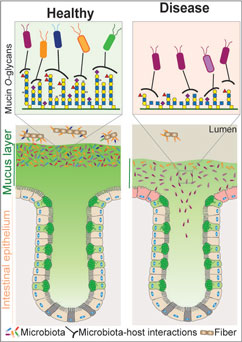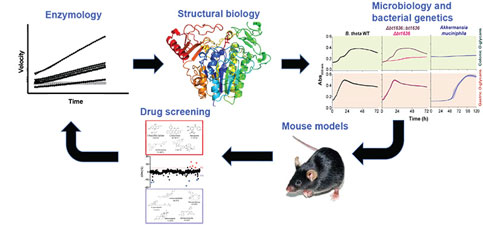Alan Cartmell
Senior Lecturer in Microbial Biochemistry
Profile
Biography
Alan completed his PhD at Newcastle University under the mentorship of Professor Harry Gilbert. The focus of Alan’s thesis was the functional and structural characterisation of novel glycoside hydrolases (GHs) to help improve the deconstruction of plant cell walls for industrial benefit. During his PhD Alan spent one year at the complex carbohydrate research centre (CCRC) at the University of Georgia, a research centre dedicated to the functional and structural characterisation of complex glycans.
Upon completing his thesis Alan obtained a Juvenile diabetes research foundation fellowship (JDRF) and started a post-doctoral research associate (PDRA) position in the laboratories of Professor Dirk Zajonc and Professor Nunzio Bottini, based at the La jolla Institute for Allergy and Immunology (LIAI). This position was focused on structure guided drug discovery for the protein PTPN22, a non-receptor tyrosine phosphatase, implicated in autoimmune diseases such as type 1 diabetes and rheumatoid arthritis.
After a short PDRA in the laboratory of Professor Spencer Williams, at the University of Melbourne, Alan returned to the laboratory of Professor Harry Gilbert. Here, Alan’s work focused on understanding how bacteria of the human gut microbiota (HGM) metabolised complex glycans through their carbohydrate active enzyme (CAZyme) repertoires. This ultimately led to Alan establishing an interest in sulfated host glycan degradation and carbohydrate sulfatases. With this focused line of research Alan was able to start his own laboratory at the University of Liverpool in August 2019.
Alan obtained a Wellcome career development award in 2023 to continue his work focusing on host glycan metabolism, in particular the role HGM carbohydrate sulfatases play in sulfated mucin metabolism and their links to inflammatory bowel disease. Alan moved his laboratory to the department of Biology at the University of York in January 2024, and is also affiliated with both the York Structural Biology Laboratory (YSBL) and the York Biomedical Research Institute (YBRI).
Research
Overview
My research interests are focused at understating the roles of carbohydrate active enzymes (CAZymes) in complex glycan degradation. My laboratories work has mainly, but not exclusively, being at understanding the roles bacterial carbohydrate sulfatases of the human gut microbiota (HGM) play in the metabolism of the sulfated host glycan mucin, and their links to inflammatory bowel disease (IBD). The HGM is a symbiotic community, primarily composed of bacteria, that is essential for human health but only if a protective layer of sulfated mucins is the correct thickness. Loss of the barrier, through over degradation leads to disease states such as IBD and colorectal cancers (Figure 1).

Figure 1: Utilisation of colonic sulfated glycans by the gut bacteria Illustration of the colonic mucin layer homeostasis in healthy and and diseased states.
Ulcerative colitis and Chron’s disease are lifelong and debilitating inflammatory bowel diseases (IBD). There is currently no cure for IBD and in severe cases it requires surgical resection of the colon. IBD is most common in European populations and is increasing yearly. It currently affects >2.5 million Europeans, with direct health costs >4 billion pounds per year. Furthermore, inflammation caused by IBD, poses an increased risk for the development of colorectal cancer, which accounts for 12 % of all cancers (Cancer Research, UK).
Cells lining the human gut are coated in a protective layer of complex, heavily-sulfated, glycans. These provide a vital food source for the symbiotic microbes that form the human gut microbiota and require specialised enzymes known as carbohydrate sulfatases for degradation and metabolism. Excessive degradation of these sulfated glycans perturbs the protective gut lining and is observed in both inflammatory bowel diseases and colorectal cancers. Due to the complexity of sulfated glycans bacterial carbohydrate sulfatases, which are required for their degradation, are exquisitely substrate specific, making them excellent targets for small molecule inhibitors. To date these inhibitors have not been developed due to a shortfall in our understanding of the structure-function of this enzyme class. My group uses an integrated molecule-to-function approach where we: 1) Define structural features of bacterial carbohydrate sulfatases that determine substrate specificity; 2) Identify which carbohydrate sulfatases elicit digestive tract disease; and 3) Identify small molecules that modulate sulfatase function for future drug development.

Figure 2: Example workflow of the laboratory's approach
The laboratories’ molecule-to-function approach uses a multidisciplinary workflow (Figure 2) centred around enzymology and structural biology (mainly X-ray crystallography and NMR). Microbiology and bacterial genetics are deployed to validate the in vitro biochemistry before looking to exploit this knowledge in animal models. High throughput screening approaches are then used on validated drivers of disease to find molecules that could form the base for future drug development.
Teaching
Undergraduate
![]()
My teaching philosophy is grounded in a research led approach. My lecture material is based on not only my own research but that of others from within my research field producing science of the highest calibre. My teaching looks to inform students of the scientific process through glycobiology and how the techniques and knowledge used can cut across a variety of other fields, thus equipping them with knowledge that they can employ in their future endeavours.
![]()
My lectures have in the past focused on how glycobiology has been deployed in biotechnological and industrial arenas. For instance how drugs have been targeted against carbohydrate active enzymes (CAZymes) to treat flu, or how they can be linked to antibodies to improve cancer treatments. CAZymes also have huge industrial potential to develop prebiotics, animal feeds, biofuels, and added value products such as surfactants for industry.
![]()
Projects offered in the Cartmell laboratory are part of the ongoing research plan and are exclusively laboratory-based. They will contribute to the generation of new knowledge and the strive for scientific advancement.

